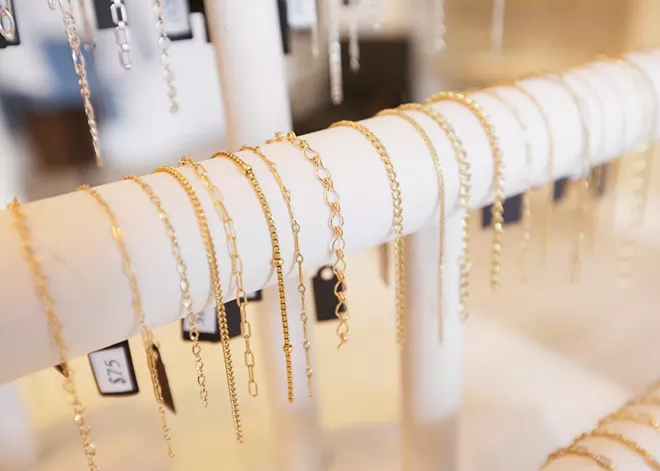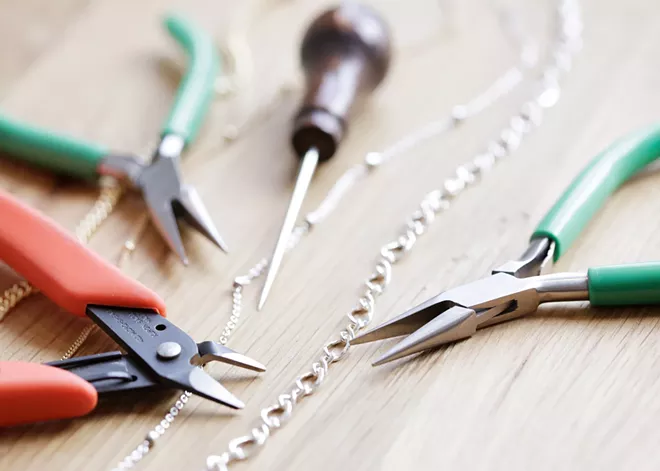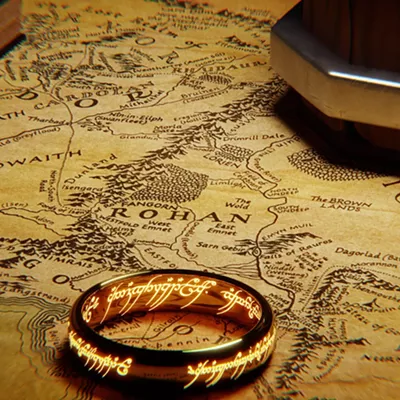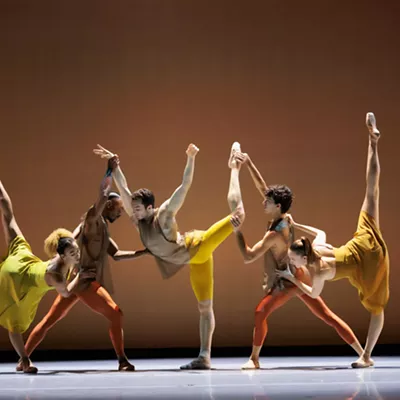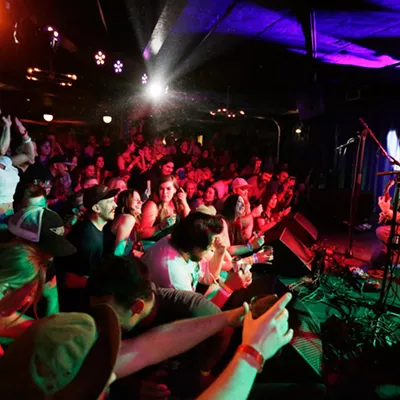Style and beauty trends come in a range of commitment levels.
Hair sparkles and eyelash extensions are pretty impermanent, while body piercings are a medium commitment (even if you remove an eyebrow ring, the puncture holes may never disappear), and permanent makeup — much like a tattoo — is basically a trust fall with your future self.
Though the very term "permanent jewelry" might send shivers up commitment-phobic spines, it's not quite as forever-ever as its name implies. If a piece of permanent jewelry ever needs to be removed for medical or safety reasons, it's easy to break the chain (to Fleetwood Mac's horror!) using household scissors, wire cutters or even nail clippers.
The now-trending ritual of permanent jewelry starts with choosing a custom-fit length of metal chain to become a bracelet, anklet, necklace or ring. Bracelets tend to be the most popular. Some folks opt for add-ons like a charm or pendant. Selecting the style and color of chain and jewelry components is the longest part of the process.
After measuring and holding the chain in place, a permanent jeweler will use a small arc welder to join the ends of the chain and secure the finished piece without a clasp. The welding portion typically takes two to five minutes and emits a quick-yet-harmless spark. The skin itself is not impacted as with a piercing or tattoo.
The concept of claspless jewelry started in 2017 when Catbird, a boutique in Williamsburg, Brooklyn, introduced something called the Forever BraceletTM, a welded bracelet meant to be worn all the time. Coining the phrase "Get Zapped," Catbird sparked a jewelry trend that has since swept the country inch by golden inch, finally reaching the Inland Northwest in 2022, when Simple Wildflower in downtown Spokane became the city's first brick-and-mortar business to offer the service.
Simple Wildflower owner Jessica Yefremov spent a year secretly researching and practicing on family members before she brought permanent jewelry to her boutique. "There wasn't a lot of training available, so I had to train myself. My boyfriend is a welder, so he knew exactly what I needed," she says.
While she appreciated practical details like not having to use her long fingernails to fiddle with a bracelet clasp or to be bothered by an adjustable connector chain dangling from her small wrists, Yefremov was mainly drawn to permanent jewelry for its sentimentality and social bonding aspect. She saw it as a way of "making memories" for her customers and "giving them that unique experience."
"I'm very sentimental, so I love sentimental pieces," Yefremov says.
Many customers mark birthdays and even difficult life events with "PJ," as it's sometimes abbreviated. Best friends or relatives buy matching jewelry. Because of this friendship bracelet factor, Yefremov doesn't price her chain by the inch like some sellers do.
"We have a flat rate [per piece]," she explains, "because if you have friends come in, and one's jewelry is a little bit bigger and one's smaller, it's just a little bit uncomfortable."
Since launching the service in August 2022, Yefremov has tallied over 2,000 permanent jewelry appointments, not including walk-ins or pop-up events. "It feels awesome. It doesn't feel like work," she says. "I've made a lot of great connections." (She means that metaphorically, BTW.)
Speaking of pop-up events, while a handful of local boutiques, salons, fine jewelry stores and tattoo studios currently offer the service, or plan to (Mom's Tattoo & Body Piercing is rolling out the service on Nov. 25), the vast majority of permanent jewelers in Eastern Washington and North Idaho areas currently offer the service only during pop-up events. They travel with chains, a folding table and an arc welder to work private PJ parties and public events.
Kyah Card of Moorea's Everlasting Jewelry is one of those pop-up permanent jewelers (though she also keeps a space for zappin' at Patti's Hair Studio in North Spokane). Card became intrigued by the trend when her Texan aunt visited Spokane and sought a permanent jeweler for a bracelet.
"I feel like it's very inclusive for people," Card says. "My aunt has larger wrists. I'm able to size it to the person to get it how they want it." Plus, she adds, "It's pretty!"
Since starting out four months ago, Card has worked a Barbie-themed party, a team-building corporate event and a bridal shower. As a testament to how quickly the trend has mushroomed in the past few years, Card (unlike Yefremov when she began researching the trend two years ago) easily found a weeklong online instruction course. For the $3,000 tuition fee, she also got starter equipment and materials.
What was once a niche thing is now an industry. Does its rapid growth come with heightened risk of exploitative practices like multilevel marketing (MLM) schemes or high pressure on consumers to buy more? (Those pricey Pandora charm bracelets come to mind.)
Cassey Hill, a sales and service specialist at Spokane's Jewelry Design Center, has been zapping for about a year but thinks permanent jewelry's price point (roughly $65-$150 per piece) means "most people are one-and-done." Other vendors say it can be addictive, but it's still rare to see wrists stacked with upwards of six bracelets.
Of course, there are some risks with permanent jewelry. For liability reasons, Jewelry Design Center won't weld permanent necklaces (due to an asphyxiation risk) and requires parental permission for those under 18. Hill also points out that a person might be allergic to certain metals and not know it until they experience a reaction. Permanent jewelry has an environmental impact, too: Those metals have to be mined.
But as far as consumer style trends go, this wave seems less of a nefarious scam and more of a fun, sparkly form of connection — a social ritual, which we humans crave. Science tells us that human beings are subconsciously attracted to shiny metal accessories because their dancing reflections of light reminds us of water, something we also crave, and require. So what if the source of that lovely shimmer isn't totally "permanent?" For a few months or years, it can still brighten our often difficult days. ♦
PERMANENT JEWELRY TIPS
Buying a permanent bracelet? Choose the wrist opposite of your watch-wearing wrist. Though a bracelet shouldn't feel tight, if it hangs very loose it's more likely to snag on doorknobs or corners. Super delicate chains are also more likely to snap.
If you know you have sensitive skin, go for the highest karat of gold filling possible. Some permanent jewelers even offer platinum chains. Be sure your permanent jeweler knows the source and true quality of their materials.
To clean permanent jewelry, use Dawn dish soap and a washcloth or old toothbrush to get into the grooves, then wipe it with an eyeglass cleaning cloth. For silver bracelets, you can even slip on a latex glove and carefully clean with brush-and-rinse silver polish.
Excessive contact with hand sanitizer, lotion, hairspray, natural hot spring water, or even certain chlorinated pools and hot tubs can alter your jewelry's color.
Make sure to ask about reattachment policies! Many permanent jewelers have a courtesy repair for the first break or a small fee to reattach thereafter.
Walk-ins are usually fine, but if you have a large group (lookin' at you, bridal showers and bachelorette parties) definitely make an appointment.
Is a piece of clasped jewelry at a boutique or jewelry store calling your name? If a shop offers permanent jewelry service, in most cases they can modify the piece to... make things permanent. (ELISSA BALL)

